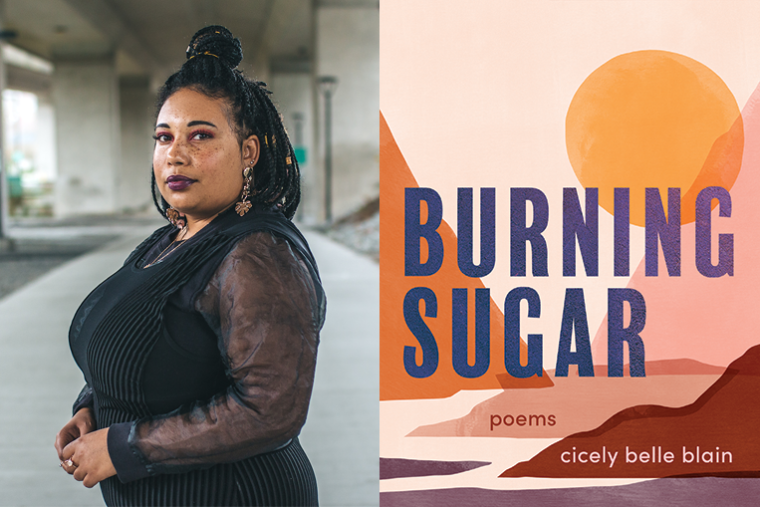This week’s installment of Ten Questions features Cicely Belle Blain whose debut poetry collection, Burning Sugar, is out today from VS. Books, an imprint of Arsenal Pulp Press. Writing about place, art, and memory, Blain is a perceptive traveler of both time and space. Though their observations often begin firmly rooted in the present, each scene quickly spirals outward, resonating across various geographies and eras. In a series of poems titled after cities around the world, Blain notes the idiosyncratic details of contemporary life while equally shedding light on each location’s complex history—too often saturated by violence against Black and Indigenous peoples. Listening for those lost voices, and following in the footsteps of other activists and civil rights leaders, Blain models how to remember everything and envision a more just future. “Burning Sugar is a vigilant time marker and vivid place maker,” writes Amber Dawn. “The bearings of colonial violence and of Black resistance are physically present on every page.” Cicely Belle Blain is a Black/mixed, queer femme writer. They are the founder of Black Lives Matter Vancouver and the founder and CEO of the diversity and inclusion consulting company Cicely Blain Consulting. They live on the lands of the Musqueam, Squamish, and Tsleil-Waututh peoples.

Cicely Belle Blain, author of Burning Sugar. (Credit: David Markwei)
1. How long did it take you to write Burning Sugar?
Burning Sugar had been an ongoing project for a while. I had several notebooks full of poems inspired by random places or events and when I saw the call for submissions from VS. Books, I brought a lot of it together in a way that made sense. From there, it took about two years to come to the final product.
2. What was the most challenging thing about writing the book?
The most challenging part for me was how personal poetry is. It’s definitely a detour from my usual writing that is more political, formal, and educational, whereas Burning Sugar exposes a lot of my inner thoughts and personal experiences. I still feel a bit nervous that it’s out there for people to read!
3. Where, when, and how often do you write?
I write anywhere and everywhere. In normal, non-COVID times, I like to travel and write about the places I visit. I also love to write in art galleries. Now most of my writing is 2 AM notes on my phone.
4. What are you reading right now?
I just finished reading Little Fires Everywhere by Celeste Ng and loved it. I definitely prefer it to the TV version but I do love seeing adaptations. I also just started it was never going to be ok by jaye simpson and I’m so excited to dig in. I’ve shared community with jaye for several years and have always been inspired by their work.
5. Which author, in your opinion, deserves wider recognition?
This is such a hard question. Any young, queer person of color who has published a book in the midst of a global pandemic.
6. What is the biggest impediment to your writing life?
Time. Even though I am now a published author, it’s still hard for me to unpack the narratives I’ve internalized that writing is a hobby or less important than other parts of my work. My hope is to be more intentional about carving out time to give my writing the care and attention it deserves.
7. What is one thing you might change about the writing community or publishing industry?
From what I’ve witnessed so far, it is like many other industries where there is a bit of an old boys’ club and a “who you know” environment. I am so lucky to work with VS. Books and Arsenal Pulp Press because they have experience supporting and uplifting marginalized writers, and that really helped me overcome a lot of the imposter syndrome that I experienced.
Before landing the opportunity to publish with VS. Books and Arsenal Pulp, I felt so intimidated and demoralized by the rejections I received. So if I were to change one thing I would encourage publishers to provide more opportunities for young people of color—who feel a lot of fear and anxiety engaging with big, white-dominated institutions.
8. If you could go back in time and talk to the earlier you, before you started Burning Sugar, what would you say?
Embrace the process, trust your instincts, make the most of the opportunities presented to you, and feel proud of yourself.
9. Who is your most trusted reader of your work and why?
It would have to be Vivek Shraya, the founder of VS. Books. I really felt like she had my best interests at heart and wanted to see me do well. She not only provided her editing skills but also unique advice about writing and publishing on the whole.
10. What’s the best piece of writing advice you’ve ever heard?
Write with yourself and your own healing in mind, before you think of anyone else.







